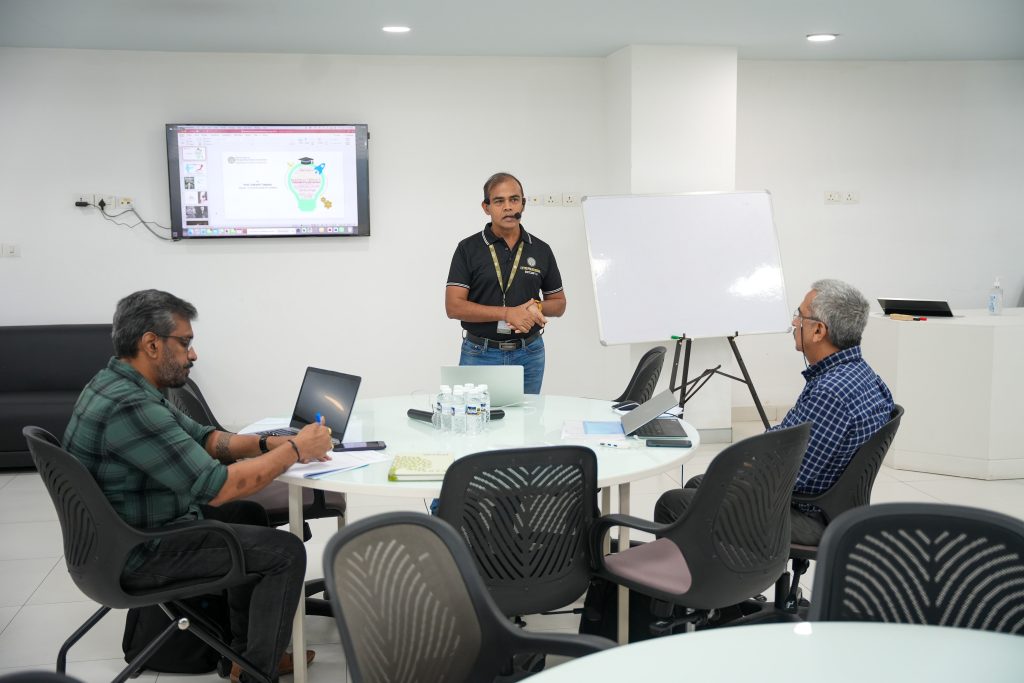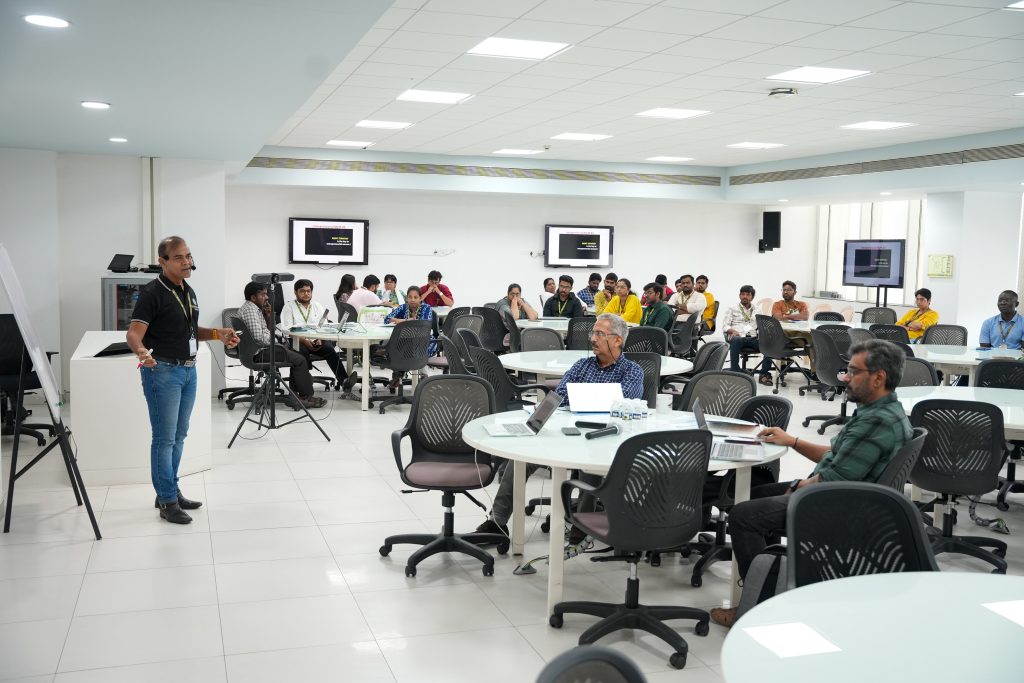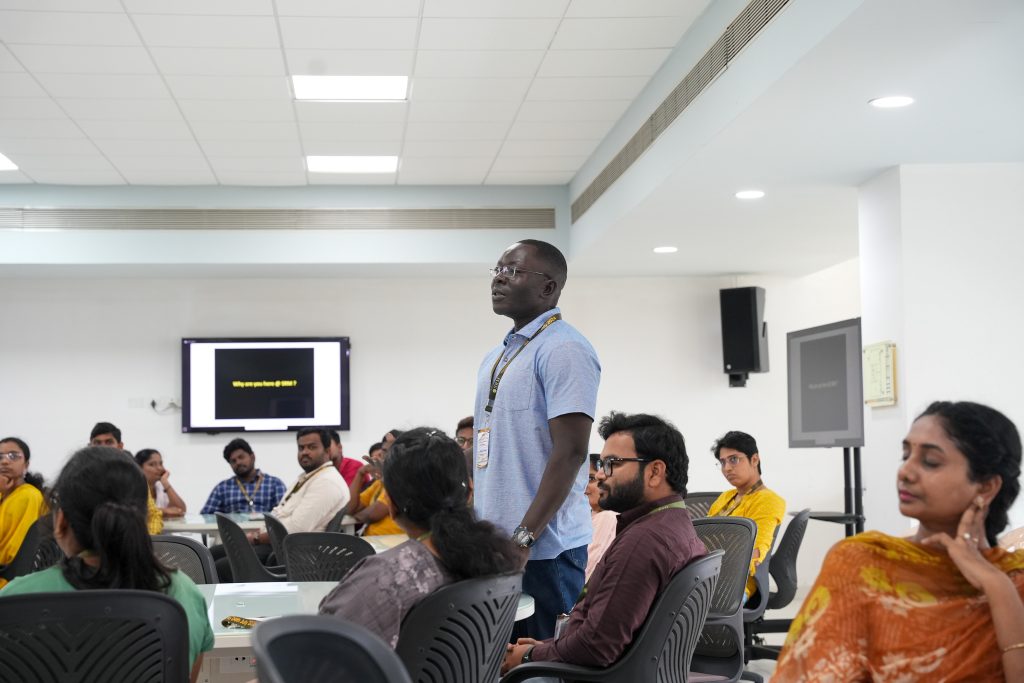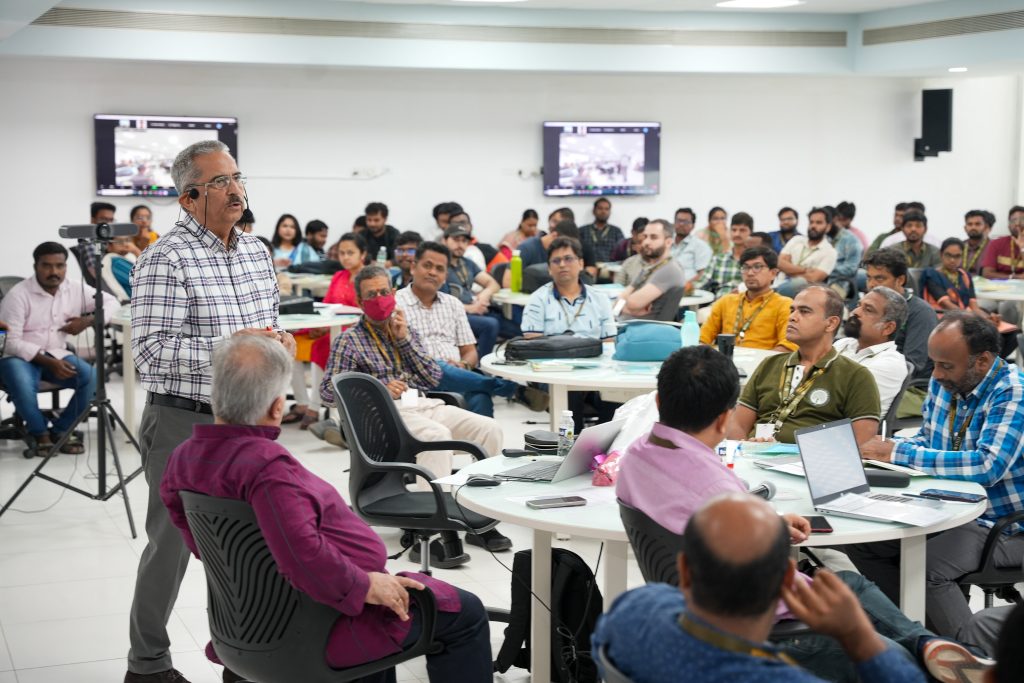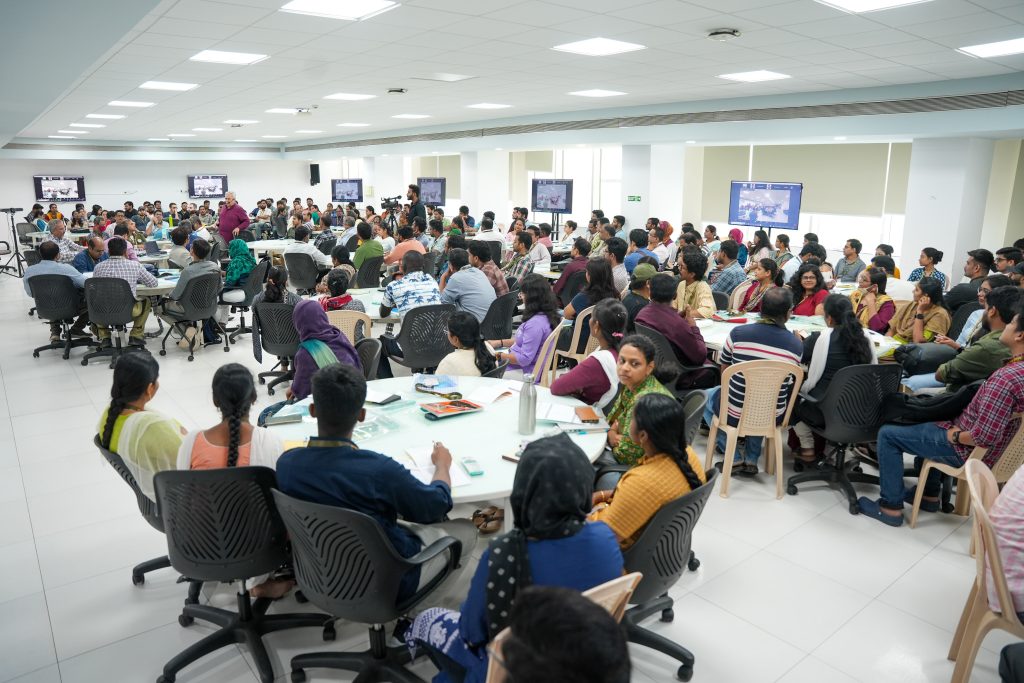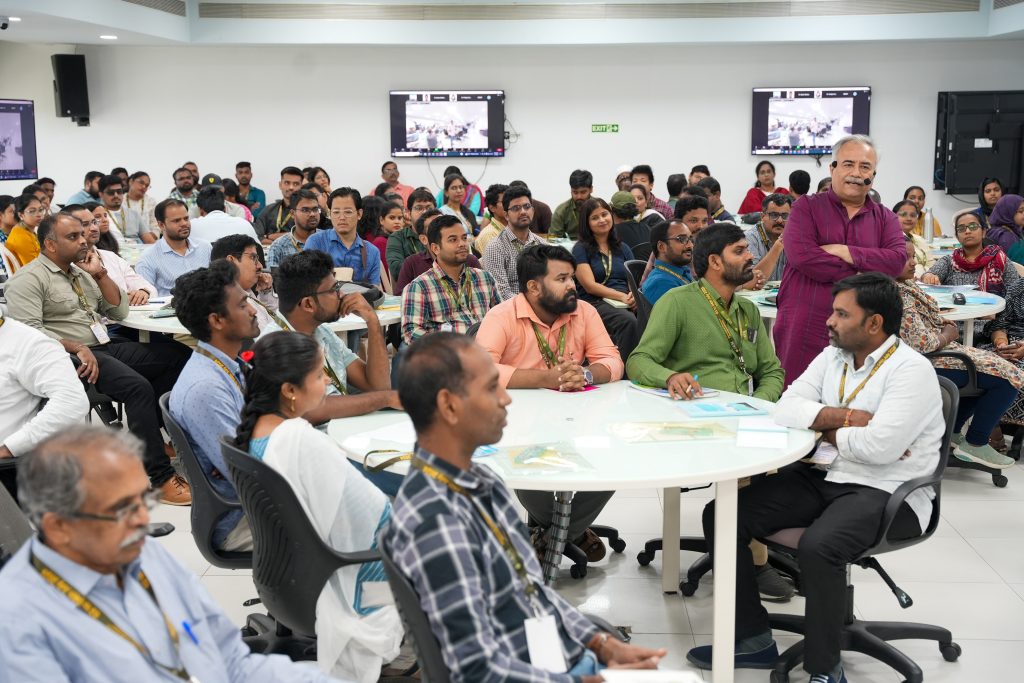Dr Soni Wadhwa Publishes Paper on Digital Libraries for Minor Languages in India
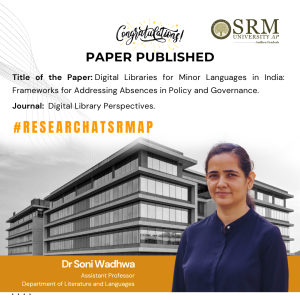 In a significant academic achievement, Dr Soni Wadhwa, Assistant Professor in the Department of Literature and Languages, has recently published a paper titled “Digital Libraries for Minor Languages in India: Frameworks for Addressing Absences in Policy and Governance.” The paper was published in the esteemed Journal Digital Library Perspectives. Dr Wadhwa’s research illuminates the importance of establishing digital libraries for minor languages in India and proposes frameworks to address existing gaps in policy and governance. This pioneering work not only explores the significance of preserving linguistic diversity but also advocates for inclusive and accessible digital resources for all.
In a significant academic achievement, Dr Soni Wadhwa, Assistant Professor in the Department of Literature and Languages, has recently published a paper titled “Digital Libraries for Minor Languages in India: Frameworks for Addressing Absences in Policy and Governance.” The paper was published in the esteemed Journal Digital Library Perspectives. Dr Wadhwa’s research illuminates the importance of establishing digital libraries for minor languages in India and proposes frameworks to address existing gaps in policy and governance. This pioneering work not only explores the significance of preserving linguistic diversity but also advocates for inclusive and accessible digital resources for all.
The publication of this paper not only adds to Dr Wadhwa’s scholarly contributions but also highlights the commitment of SRM University-AP faculty members to engaging in research that can have a positive impact on society.
Abstract
This study aims to deliberate on strategies for enlisting community support for gathering diverse learning resources in different languages and for enlisting participation in activities such as crowdsourcing in initiatives such as annotations and transliteration. This paper calls for interventions that imagine and create infrastructure for the flourishing of smaller libraries that can draw from and feed into large-scale national and international libraries. Offering a conceptual framework to rethink the country’s approach toward minor languages, it first offers an overview of policies and initiatives relevant to the concerns of minor languages in digital libraries in India. Based on the policy analysis, it then goes on to suggest starting points for policy designers and custodians of libraries to help them work toward better representation of languages in their resources.
The existing frameworks analyzed here for the greater or representation of minor Indian languages reveal a culture of silence toward the issue of language. With some advocacy, these frameworks can be mined to craft different ways that are critical not just for enriching libraries but also for preservation of cultural heritage of the communities concerned, thus adding a larger social dimension to the question of access.
Explanation of the Research in Layperson’s terms
Given that Indian languages in general are under-represented on the internet and that languages of minority linguistic groups find very little space on digital platforms, it is imperative for institutions such as libraries to cater to smaller communities and their educational needs while also reaching out to them in their own languages. While a lot of socio-political discourse on minority languages in India exists, this study pushes for their bearing on digital libraries, educational frameworks and cultural heritage. It offers five suggestions for strengthening the presence of minor languages in digital libraries in India.
Details in citation format
Wadhwa, S. (2024), “Digital libraries for minor languages in India: frameworks for addressing absences in policy and governance”, Digital Library Perspectives, Vol. ahead-of-print No. ahead-of-print. https://doi.org/10.1108/DLP-01-2024-0002
Practical Implications
This viewpoint paper can be used to enhance policy and governance around libraries. With National Education Policy 2020, which emphasises the importance of learning in regional/mother/Indian languages, Indian educational system as well as social institutions need stronger platforms to make resources in Indian languages available to students as well as lifelong learners. With more of such research, it will be possible to come up better digital infrastructure for Indian languages.
Social Implications
Indian languages are not widely represented on the Internet and in the knowledge set up. Making existing resources and knowledge available in digital libraries will stimulate further research on generating further research and knowledge production in Indian languages. It is hoped that more research in the domain of Indian languages works towards the digital divide and knowledge divide in India.
Collaborations
This research came out of the researcher’s previous archival work. Her digital archive PG Sindhi Library is dedicated to post-partition Sindhi writing in India. This article is based on an invited talk delivered at the international symposium titled “Digital Libraries: Sustainable Development in Education” held at IIT Kharagpur in India in November 2023. The author is grateful to the organisers and fellow participants for their feedback.
Future Research Plans
The researcher is involved in a sanctioned project titled “Sindhi Sanchaya: Building a Comprehensive and Interactive Database of a Partitioned Literature” funded by IIT Indore. She hopes to build on this work produced in this article as she makes progress in the project.
- Published in Departmental News, English Current Happenings, News, Research News
Groundbreaking Paper Offers Geo-Temporal Visualisation of COVID-19 Spread in India
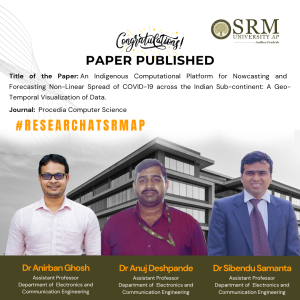 In an exciting development, Dr Anirban Ghosh, Dr Anuj Deshpande, and Dr Sibendu Samanta, Assistant Professors from the Department of Electronics and Communication Engineering, have recently achieved a significant milestone with the publication of their paper titled “An Indigenous Computational Platform for Nowcasting and Forecasting Non-Linear Spread of COVID-19 across the Indian Sub-continent: A Geo-Temporal Visualization of Data” in the esteemed journal, Procedia Computer Science.
In an exciting development, Dr Anirban Ghosh, Dr Anuj Deshpande, and Dr Sibendu Samanta, Assistant Professors from the Department of Electronics and Communication Engineering, have recently achieved a significant milestone with the publication of their paper titled “An Indigenous Computational Platform for Nowcasting and Forecasting Non-Linear Spread of COVID-19 across the Indian Sub-continent: A Geo-Temporal Visualization of Data” in the esteemed journal, Procedia Computer Science.
The paper focuses on the development of a state-of-the-art computational platform specifically tailored for nowcasting and forecasting the non-linear spread of COVID-19 across the Indian sub-continent. This pioneering work promises to offer valuable insights into the geo-temporal visualisation of data related to the COVID-19 pandemic, with potential implications for public health interventions and policy decisions.
The publication of this paper serves as a testament to the innovative research being conducted by the faculty members at the Department of Electronics and Communication Engineering. Their dedication and expertise in the field have not only contributed to advancing scientific knowledge but also hold considerable promise for making a real-world impact in the ongoing fight against the COVID-19 pandemic. We extend our congratulations to Dr Anirban Ghosh, Dr Anuj Deshpande, and Dr Sibendu Samanta for this remarkable accomplishment and look forward to witnessing the continued impact of their research in addressing critical challenges facing the world today.
Abstract
The rapid spread of the COVID-19 pandemic necessitated unprecedented collective action against coronavirus disease. In this light,we are proposing a novel online platform for the visualisation of epidemiological data incorporating social determinants for understanding the patterns associated with the spread of COVID- 19. The current AI computational platform combines modelling methodologies along with temporal, geospatial visualisation of COVID-19 data, providing real-time sharing of graphic analytical simulation of vulnerable hotspots of recurrent (nowcasting) and emergent (forecasting) infections visualised on a spatiotemporal scale on geoportals. The proposed study will be a secondary data analysis of primary data accessed from the national portal (Indian Council of Medical Research (ICMR)) incorporating 766 districts in India. Epidemiological data related to spatiotemporal visualisation of the demographic spread of COVID-19 will be displayed using a compartmental socio-epidemiological model, reproduction number R, epi-curve diagrams, as well as choropleth maps for different levels of administrative and development units at the district levels.
Explanation of the Research in Layperson’s Terms
The rapid spread of COVID-19 required quick and coordinated action. To aid the process, we have created a new online platform to help visualise COVID-19 data, including social factors that affect its spread. Our platform uses advanced computer models and shows COVID-19 data over time and across locations. It allows real-time sharing of visual analyses, highlighting areas at risk for current and future infections. The effectiveness of the platform lies in the fact that it is not limited to COVID-19. It can be suitably modified and employed for capturing similar trends for any future pandemic.
Title of the Research in the Citation Format
Priya Ranjan, Dhruva Nandi, Karuna Nidhi Kaur, Rohan Rajiv, Kumar Dron Shrivastav, Anirban Ghosh, Anuj Deshpande, Sibendu Samanta, Rajiv Janardhanan, “An Indigenous Computational Platform for Nowcasting and Forecasting Non-Linear Spread of COVID-19 across the Indian Sub-continent: A Geo-Temporal Visualization of Data”, Procedia Computer Science, Volume 235, 2024, Pages 496-505, ISSN 1877-0509,
https://doi.org/10.1016/j.procs.2024.04.049
Practical Implementation and Social Implications Associated
As mentioned earlier, the platform can be used to present real-time data analysis and identify emerging and current hotspots of the COVID-19 pandemic. However, the beauty or robustness of the platform lies in the fact that it can be suitably adapted for similar analysis for any future pandemic with minimum effort.
Collaborations
- University of Petroleum and Energy Studies, Energy Acres, Dehradun, Uttarakhand, India
- SRM Medical College Hospital and Research Centre, SRMIST, Kattankulathur, Tamil Nadu, 603203, India
- Amity Institute of Public Health, Amity University, Noida, Uttar Pradesh, 201303, India
Future Research Plans
The future plan includes improving the visual and graphical presentation of the platform to provide more insightful and intuitive information. Aggregation of data from other international databases would further augment the effectiveness of the platform by not limiting it to only the national scenario.
- Published in Departmental News, ECE NEWS, News, Research News
Dr Sanjay Kumar and Team Publish Digital Image Security Invention in the Patent Office Journal
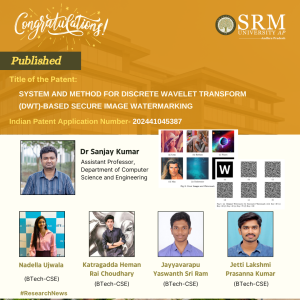 In a recent development, Dr Sanjay Kumar, Assistant Professor in the Department of Computer Science and Engineering, along with a team comprising N Ujwala, J Yashwanth Sri Ram, J Lakshmi Prasanna Kumar, and K Heman Rai Choudhary, have successfully filed and published an innovative invention in the Patent Office Journal titled “SYSTEM AND METHOD FOR DISCRETE WAVELET TRANSFORM (DWT)-BASED SECURE IMAGE WATERMARKING” with the application number “202441045387”.
In a recent development, Dr Sanjay Kumar, Assistant Professor in the Department of Computer Science and Engineering, along with a team comprising N Ujwala, J Yashwanth Sri Ram, J Lakshmi Prasanna Kumar, and K Heman Rai Choudhary, have successfully filed and published an innovative invention in the Patent Office Journal titled “SYSTEM AND METHOD FOR DISCRETE WAVELET TRANSFORM (DWT)-BASED SECURE IMAGE WATERMARKING” with the application number “202441045387”.
This invention holds great promise in the field of digital image security and watermarking. The patented system and method are based on the discrete wavelet transform (DWT), a widely used signal processing technique, to embed secure watermarks into digital images. The application of DWT ensures that the watermarking process is robust and secure, making it suitable for a wide range of applications where image integrity and authenticity need to be ensured.
Dr Sanjay Kumar’s expertise as an Assistant Professor, coupled with the team’s skills and dedication, has resulted in the successful development and patenting of this cutting-edge technology. The “SYSTEM AND METHOD FOR DISCRETE WAVELET TRANSFORM (DWT)-BASED SECURE IMAGE WATERMARKING” promises to be a significant addition to the field of digital image security and watermarking, offering enhanced protection against unauthorised tampering and misuse of digital images. It is expected that this invention will garner attention from industry professionals, researchers, and policymakers, paving the way for its integration into diverse digital imaging systems.
Abstract
Our research introduces a robust image watermarking technique that combines Discrete Wavelet Transform (DWT) and chaotic map-based encryption. The method analyzes high-frequency sub-bands derived from DWT applied to the blue channel of an RGB image, selecting the block with the highest energy for embedding a grayscale watermark encrypted with the Henon Map. The alpha blending technique is used to integrate the encrypted watermark, ensuring both imperceptibility and robustness. The method achieves an average PSNR of 43.7211 dB and SSIM of 0.9950. The watermark can be extracted by analyzing patterns in the high-frequency component, even after various attacks, using inverse DWT and Henon Map for decryption.
Explanation of the Patent in Layperson’s Terms
Our research focuses on protecting digital images by embedding a hidden watermark that is hard to remove. We use a mathematical method called the Discrete Wavelet Transform (DWT) to break down an image into different parts and find the best place to hide the watermark. The watermark is further secured by encrypting it with a technique called the Henon Map. Our method ensures that the watermark remains invisible to the naked eye while being resistant to tampering. This means the watermark can be detected and recovered even if the image is altered.
Practical Implementation and the Social Implications
The primary application of our research is in protecting the ownership and integrity of digital images. This technique can be used by photographers, artists, and digital content creators to ensure their work is not copied or altered without permission. By embedding a secure, invisible watermark, they can prove ownership and detect unauthorised use. Additionally, this method can be applied in sensitive fields such as medical imaging and legal documents where tamper detection is crucial.
Collaborations
This research was conducted by the Visual Information Processing Lab at the Department of Computer Science and Engineering, SRM University AP, Guntur, India. The team comprised Nadella Ujwala, Sanjay Kumar, Jayyavarapu Yaswanth Sri Ram, Jetti Lakshmi Prasanna Kumar, and Katragadda Heman Rai Choudhary.
Future Research Plans
Our future research will focus on enhancing the watermarking technique’s robustness against more sophisticated attacks, exploring real-time applications in video watermarking, and developing methods to embed multiple watermarks in a single image. We also aim to reduce the computational complexity to make the algorithm more efficient for practical applications.
- Published in CSE NEWS, Departmental News, News, Research News
Research to Revenue: 3-day Workshop Concludes
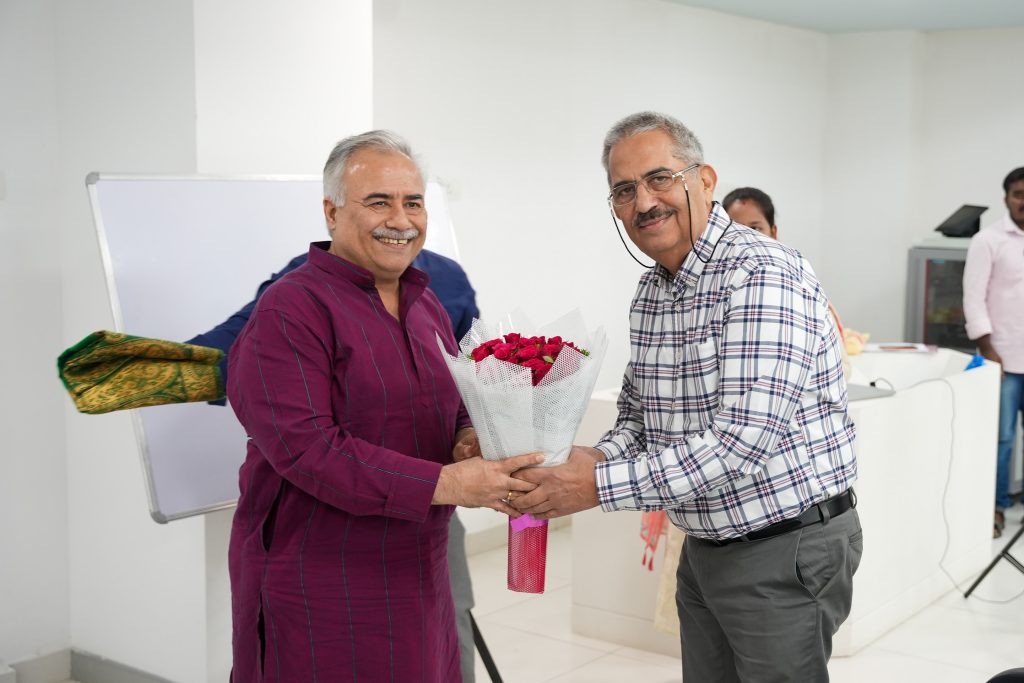 The Office of the Dean-Research and IPR Cell at SRM University-AP hosted a highly impactful 3-day Workshop on “Research Commercialisation.” The workshop was graced by industry expert Mr Rakesh Sharma, a leading figure in business restructuring and global marketing. Mr Sharma with his notable experience of 38 years at Philips, imparted valuable insights on innovation, venture development, and commercialisation.
The Office of the Dean-Research and IPR Cell at SRM University-AP hosted a highly impactful 3-day Workshop on “Research Commercialisation.” The workshop was graced by industry expert Mr Rakesh Sharma, a leading figure in business restructuring and global marketing. Mr Sharma with his notable experience of 38 years at Philips, imparted valuable insights on innovation, venture development, and commercialisation.
The workshop was attended by faculty and research scholars, all keen on understanding the intricacies of research commercialisation. The inaugural ceremony of the workshop was highlighted by the felicitation of Mr Sharma by the Vice Chancellor, Prof. Manoj K Arora, along with Prof. Ranjit Thapa, Dean—Research; Deans of the three schools; Prof. G S Vinodkumar, Coordinator—IPR Cell & Convenor of this workshop; and other senior faculty members.
In his address, Prof. Manoj K Arora underscored the critical role of research, he urged the attendees to “think differently and change your mindset to unlock the boundless potential of your research and innovation.” He engaged with faculty and research scholars, seeking their perspectives. Prof. Ranjith Thapa, the Dean of Research, presented an overview of the varsity’s research capabilities, spotlighting its achievements in Q1 publications and patents across different departments.
Day 1– The workshop kicked off with Mr Sharma encouraging participants to voice their queries and concerns about commercialisation. Key discussion points covered included linking university research with practical applications, the transformation of patents and research into industry-ready products, understanding market needs, fundraising for research projects, and leveraging humanities and liberal arts in patent implementation. Mr Sharma engaged with each of the queries and closely explained to the students with simple and easy-to-understand examples, thereby making the session worthwhile and interesting.
Day 2—Scholars had the opportunity to present their published and granted patents. They received constructive feedback from faculty and Mr Sharma and understood how these patents could be further developed for commercialisation, thereby leading to fruitful discussions on improving and materialising these ideas.
Day 3– A significant outcome of the workshop was the proposal to establish a new centre for research commercialisation designed to offer students an in-house pathway to commercialise their patents. This initiative received widespread acclaim from all participants and sparked engaging discussions about transforming research into viable business ventures, facilitated by the session by the Director of Entrepreneurship and Innovation, Mr Sidharth Shankar Tripathy.
The workshop offered a crucial platform for students, offering both inspiration and guidance in their pursuit of entrepreneurship. The event was specifically designed for all PhD Scholars who are currently working on their research papers and looking for ways to commercialise their innovative ideas, projects, or inventions.
Through a series of expert-led sessions, interactive discussions, and networking opportunities, students were encouraged to think critically about their project’s potential impact, market readiness, and the pathways to achieving sustainable business growth.
- Published in News, Research, Research News, Research Workshop, Workshop



